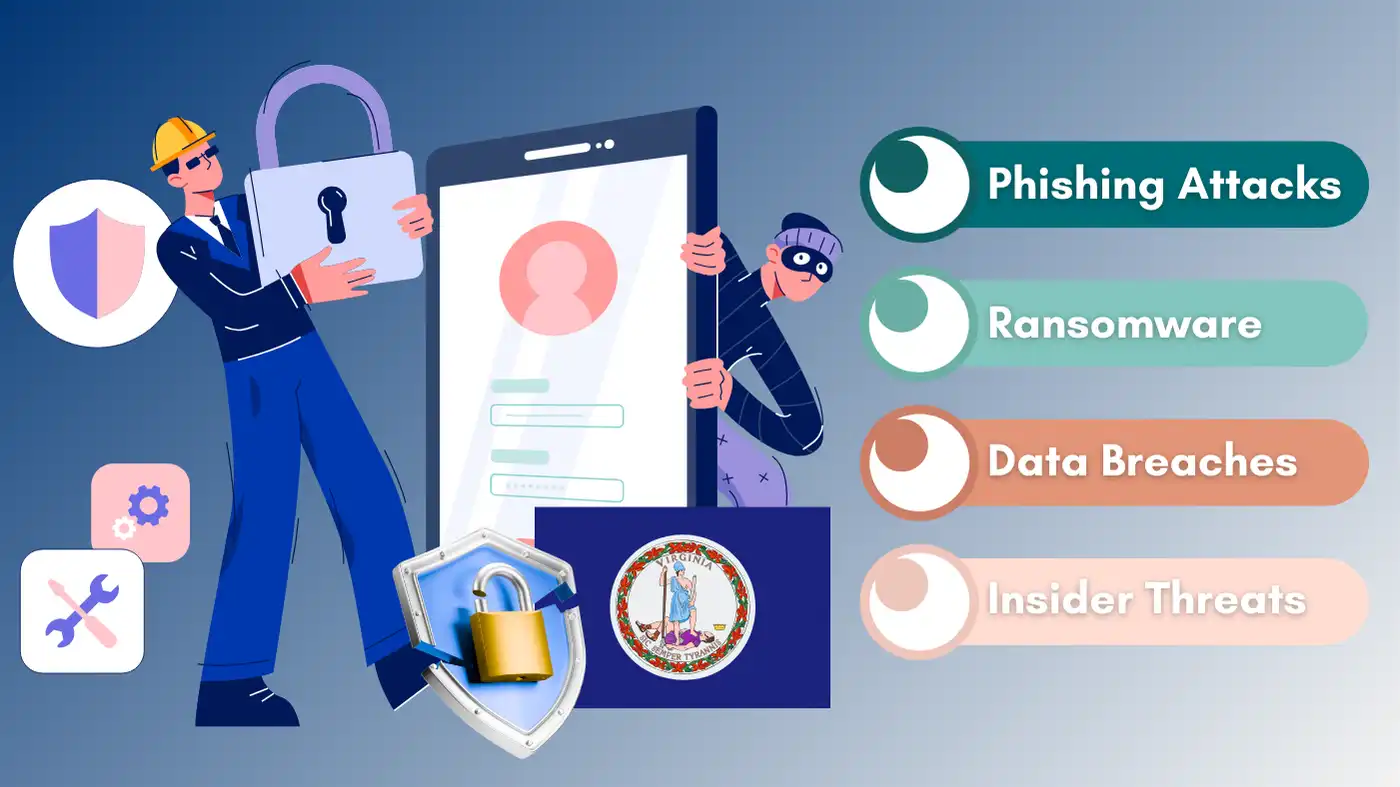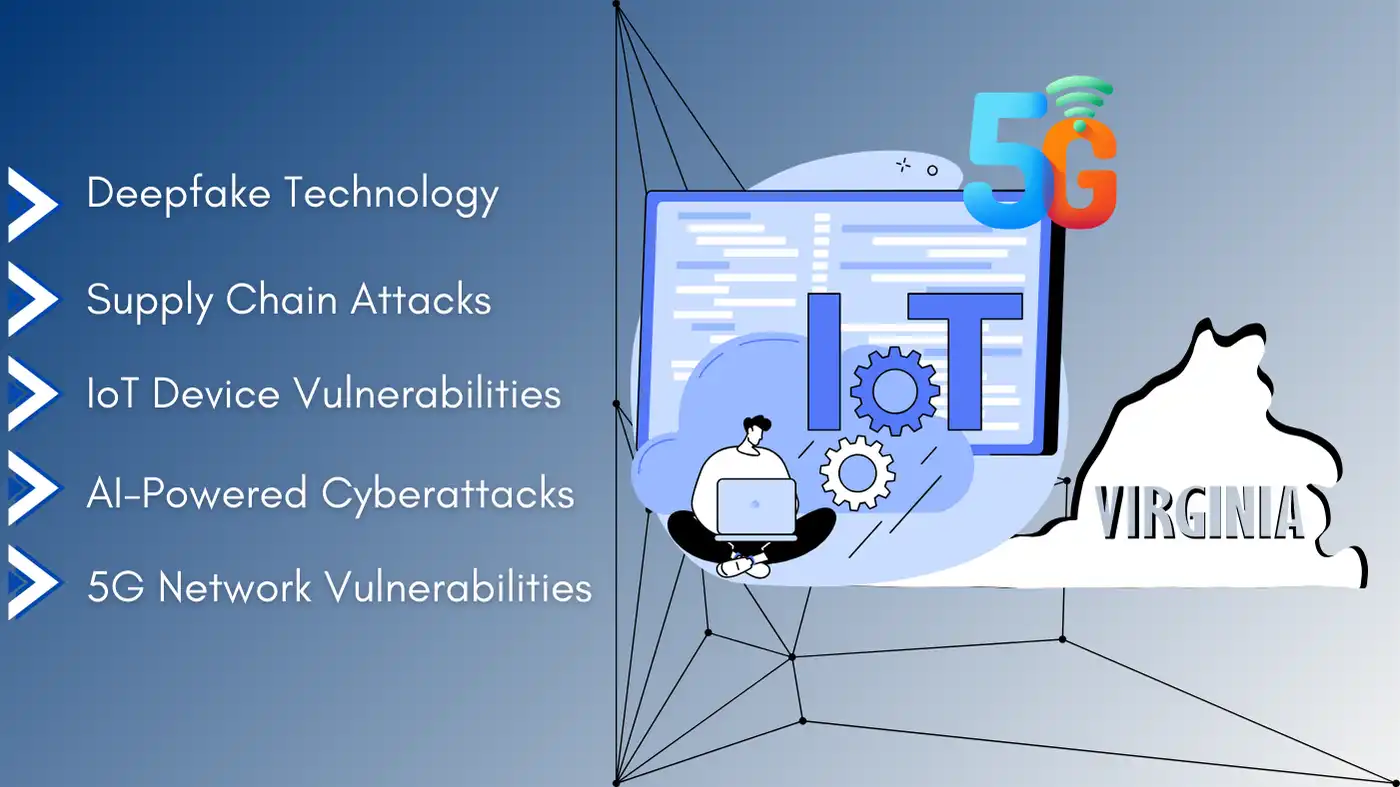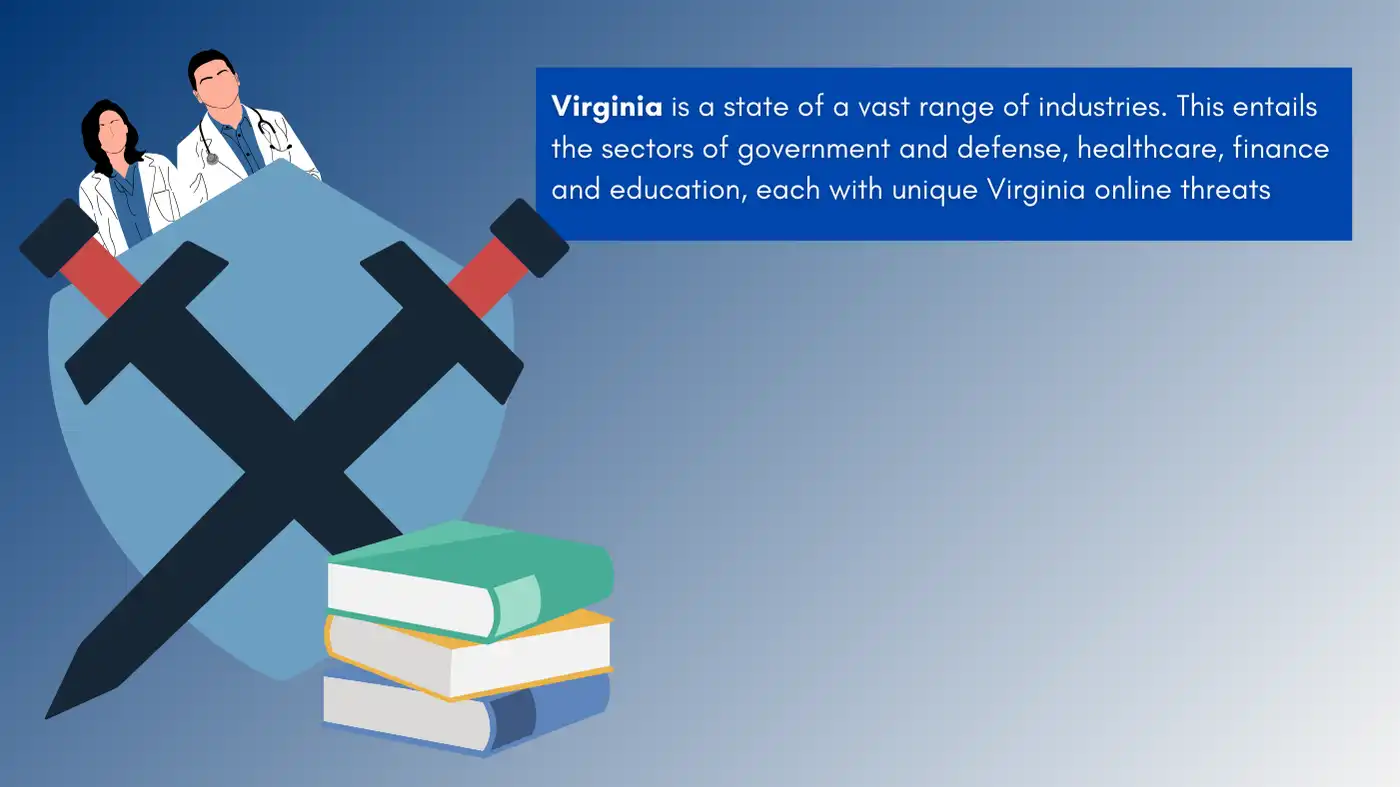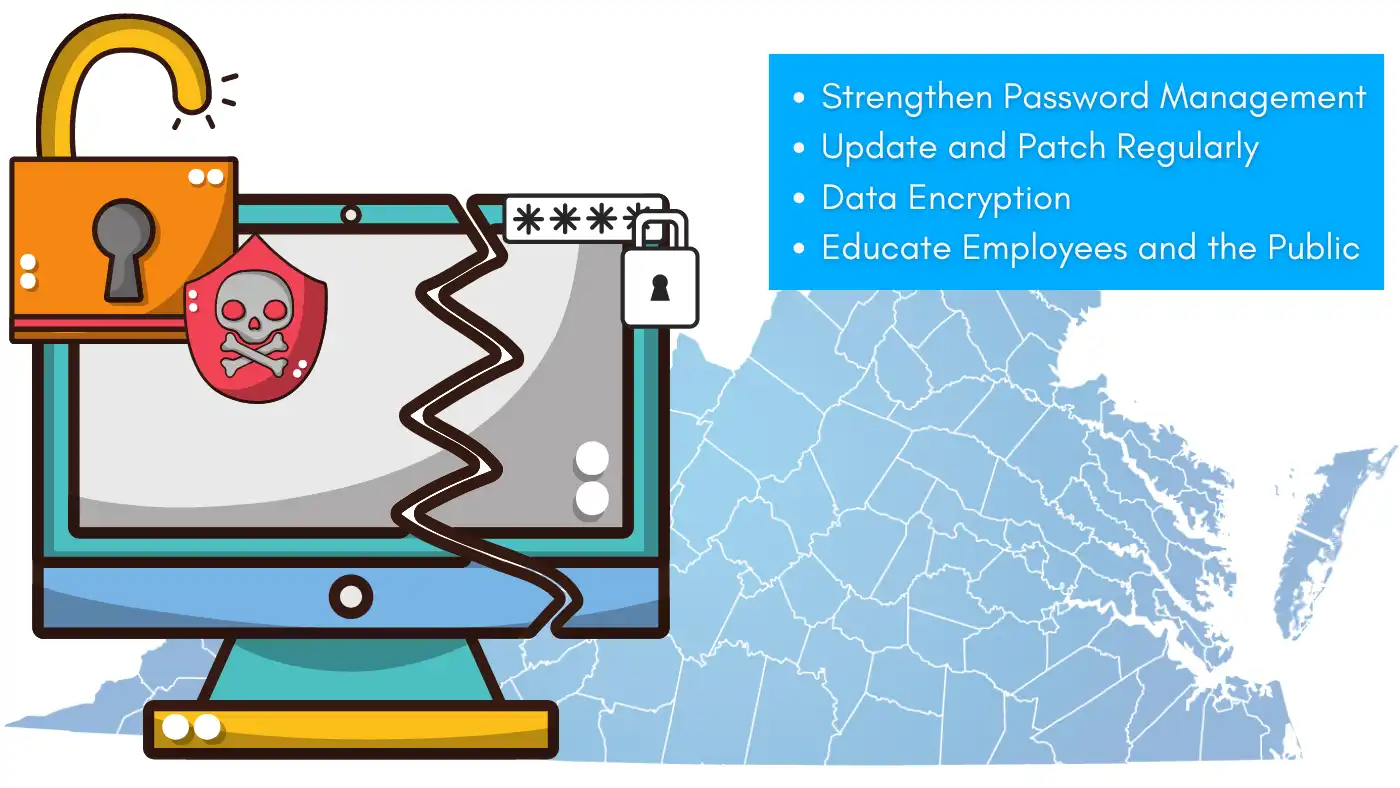Cyber threats are on the rise everywhere, and Virginia is no exception. Whether you are at home browsing or running a business, cyber threats in Virginia and the digital world are full of risks that can disrupt your life or operations.
From phishing emails to ransomware attacks, it is important to know what is out there and how to protect yourself.
In this article, we will break down some of the most common and emerging Virginia online threats and offer tips and tools to keep you safe. We will cover everything from simple fixes like strong passwords to advanced measures like cyber insurance. Let us dive in and learn how to stay ahead of these growing threats.
Common Cyber Threats In Virginia

Virginia, similar to the world, has its list of online threats and impacts individuals and businesses alike. Since the state has been relentlessly increasing its digital infrastructure, it is only best to know these Virginia online threats and how these will impact your personal data, finances or even business operations.
Phishing Attacks
Phishing is among the most persistent cyber threats in Virginia. It is an attack by fraud. Apparently authentic emails or messages to compel users to disclose sensitive information, including log-in credentials or credit card numbers. Such attacks have evolved and mimic trusted organizations, such as government agencies or popular service providers.
Ransomware
Ransomware attacks are also on the rise in Virginia. In this style of attack, cyber hackers break into a system, encrypt sensitive information and threaten to release the data unless a ransom is paid.
Businesses, schools and even government organizations in Virginia have been easy prey. Ransomware can lead to very serious disruption, ensuring loss due to finance and operations being shut down.
Data Breaches
As businesses and the government agencies are handling more sensitive information in Virginia, the risk of data breach has really gone up.
Hackers target any crack in the networks to steal away the customers’ data like financial information and social security numbers as well as health record data. The end result usually is identity theft and financial fraud.
Insider Threats
Whether intentional or accidental, insider threats are becoming a growing concern in Virginia.
An insider might maliciously or inadvertently disclose sensitive information to someone with the access to that data. This is therefore a major cyber risk for any organization at any scale.
Distributed Denial of Service (DDoS) Attacks
DDoS attacks have emerged lately as a second most common attack carried out by cybercrooks against businesses or governmental operations.
This includes flooding the servers with a large amount of traffic and is said to be on the increase in Virginia, aimed at local government services and major businesses.

- Lightning-fast speeds to browse without lag
- Servers in 105+ countries around the globe
- Military-grade security to stay safe online
- Try it risk-free with its money-back guarantee
- Native apps for all major devices
Emerging Cyber Threats In Virginia

As technology changes daily, Virginia online threats are getting more complex. Targeting individuals, businesses and even governments.
With emerging risks coming in with new tactics from cybercriminals, there is a need to stay updated on what is happening. Here are some of the latest cyber threats Virginia residents and businesses should know about:
Deepfake Technology
Latest one is deepfake technology, through which an image, video or audio can be manipulated to create content that is convincing yet fake.
This would worry the Virginia political landscape and businesses whereby deepfakes would be used for fraudulent purposes or to harm reputation.
Supply Chain Attacks
Interconnected businesses in Virginia have made the companies vulnerable to attacks through the supply chain.
Hackers focus on third-party vendors or providers connected to large organizations’ networks. This has always been a matter of concern for government agencies and large corporations, which have a number of vendors in their business systems.
IoT Device Vulnerabilities
This results from the rise in intelligent devices, such as those at various homes and workstations in Virginia. The IoTs present varying cyberspace challenges across the country, making it essential to secure IoT devices from cyber threats.
Most of these IoTs lack adequate security design, which puts them vulnerable to hackers seeking to exploit their weaknesses to gain access to home networks or company information.
Cloud-Based Threats
Cyber-crooks are discovering the cloud infrastructure and using it as a gateway to enter a business’s network. This is normally achieved through misconfigurations or security protocols that can be easily bypassed.
Many cloud-based systems are open to unauthorized access or data breaches or malware and this can be applied. Businesses here in Virginia are embracing cloud solutions at an incredible rate and so this is becoming one of the emerging risks.
AI-Powered Cyberattacks
It is used both for defense cybersecurity and by cybercriminals. AI can automate attacks, making them faster and more adaptable than ever.
In Virginia, AI-powered attacks such as adaptive phishing and autonomous malware are getting all the attention from business and cybersecurity professionals.
5G Network Vulnerabilities
As 5G rolls out in Virginia, so will the increases in possible cyberattacks on these high-speed connections.
While 5G allows for better connectivity, it also expands their attack surface for hackers to exploit, especially through IoT devices or unsecured networks, raising concerns about how 5G affects VPN security.
Industry-Specific Cyber Threats

Virginia is a state of a vast range of industries. This entails the sectors of government and defense, healthcare, finance, and education, each with unique cyber threats in Virginia.
By getting to know the cyber threats Virginia industries face, organizations can shape their cybersecurity strategies to suit specific risks.
Government and Defense
Virginia is a state which houses federal agencies and defense contractors. In this regard, government sectors become the high-profile focus of cyber threats in Virginia.
The types of attacks those organizations were subjected to included nation-state-sponsored espionage and ransomware, seeking to down operations, steal sensitive data, or breach classified information.
In response, government organizations must have advanced encryption, network segmentation, and multi-layered defenses to ensure reduced risk.
Healthcare
Ransomware and data breaches have been upping the ante for healthcare organizations in Virginia, mostly large hospital networks.
Data breaches concerning patient health records sell big-time on dark web markets or are held for ransom.
Therefore, Virginia-based healthcare providers must emphasize proper data protection through end-to-end encryption, multi-factor authentication (MFA), and regular audit processes to protect their patients’ data.
Addressing cybersecurity in Virginia is critical to safeguarding sensitive healthcare information.
Financial Institutions
The majority of phishing, fraud, and credential theft attacks are focused on banks and financial services.
Virginia’s financial institutions have always invested quite heavily in fraud detection systems and zero trust security frameworks to prevent unauthorized access and theft of identities.
But with the evolving nature of Virginia digital security risks that allow hackers to bypass defenses easily, continuous updates in the form of threat intelligence and transaction monitoring are basic necessities to stay ahead of these threats.
Education
Growing e-learning and adoption of online learning platforms have increased the vulnerability of institutions of learning in Virginia to cyberattacks.
The most common threats include DDoS attacks that interfere with online classes, phishing campaigns targeting students and staff, among others.
These Virginia digital security risks mean schools and colleges need to have effective firewalls and VPNs as well as cybersecurity training.
Retail and E-Commerce
There are threats from emerging retail and e-commerce enterprises in Virginia.
Fraud at checkout counters, they steal credit card information from POS systems or the online transaction platforms, these are what attackers are after.
PCI DSS compliance and tokenization will help wipe out the threats that may arise by securing payment data.
How To Mitigate Cyber Threats In Virginia

Some of the proactive strategies and tools adopted in reducing the risks faced by Virginia residents and businesses in fighting emerging cyber threats include the following ways of increasing cybersecurity and how to protect against cyber threats in Virginia and preventing the threats in the state:
Strengthen Password Management
One of the easiest and most effective means of countering cyber threats is by using strong unique passwords for all accounts.
Users should be encouraged to use a password manager like LastPass or 1Password, which can securely generate and store passwords.
The use of personal information should be avoided while passphrases should be used instead of single words.
Implement Multi-Factor Authentication (MFA)
MFA implies an additional level of protection by seeking authentication beyond just the password, with something like an SMS or authentication application.
It would prevent access to and usage of unauthorized information even if a password has been compromised.
Organizations in Virginia should be highly austere on MFA for all the systems and accounts of employees, especially in risky sectors, such as healthcare and finance, to enhance online safety in Virginia.
Update and Patch Regularly
Regular software updates and patches are always a requirement to fix vulnerabilities in operating systems, applications and browsers.
Access to a system is often acquired by cybercriminals by using older and outdated software.
All your software should be actively checking for important patches to ensure itself secure and active automatic updates should be on.
Use Firewalls and Antivirus Software
The first line of defense to prevent unauthorized access into a network is through firewalls.
Antivirus software scans, identifies and removes malware, viruses and other malicious applications.
Businesses and users need to deploy trusted firewall and antivirus solutions to protect the devices and networks from cyber threats.
Educate Employees and the Public
With education on your side, cyber threats are easily countered. Cybersecurity training is held frequently to train the workforce regarding phishing attacks, avoiding malicious links, and managing sensitive information.
Public awareness initiatives can focus particularly on organizations in Virginia to minimize human error, which is often the reason for security breaches, thus contributing to online safety in Virginia.
Deploy a Virtual Private Network (VPN)
A VPN encrypts an internet connection, thereby protecting sensitive information when you are accessing public Wi-Fi or conducting confidential activities online.
It then means that using a VPN will mask IP addresses for individuals and businesses in Virginia, making it private and secure. This is a vital part of how to protect against cyber threats in Virginia by ensuring privacy online.
Data Encryption
All sensitive data must be encrypted when it moves through networks and in storage. It eliminates the chances of unauthorized users accessing the data in case the security of the system is breached.
Businesses handling any kind of personal information are always encouraged to ensure that all customer and employee information is fully encrypted. These businesses range from healthcare companies to retail businesses.
Regular Data Backups
Data backups are necessary for fighting most ransomware attacks and other types of cyber attacks that focus on data.
Through safe and frequent local and cloud-based back-ups for your business, you will be able to recover lost data during an attack.
The safety is ascertained by storing the backups in different places and offline, thus not to be affected during an attack.
Secure Your Network
Other strong network security measures are network segmentation, Wi-Fi secured with very long passwords and encryption by WPA3.
In addition, access to sensitive data and systems should be available only to employees who will utilize them.
Large organizations can deploy IDPS to monitor the network for suspicious activities.
Incident Response Plan
It is the well-documented incident response plan that prepares businesses in Virginia for a cyberattack.
Isolating affected systems and notification of relevant stakeholders at least form a fundamental part of an incident response plan.
And then there must be some guidelines for recovery from the incident. To be prepared, the drills and updates to the plan are necessary.
By adopting these mitigation strategies, Virginia residents and businesses can significantly reduce their exposure to Virginia online threats and protect against cyber threats Virginia faces in today’s digital landscape.
Cyber Insurance
With advancing cyber threats Virginia, many businesses have become interested in cyber insurance as a way to minimize financial losses arising from data breaches, ransomware attacks, and other cybersecurity breaches.
Cyber insurance coverage will help organizations recover from such losses by offsetting the cost of legal fees, regulatory fines, system repairs, and data recovery.
What Does Cyber Insurance Cover?
Most cyber insurance policies offer coverage in all of the following except:
- Data breaches: Assists with paying for expenses associated with notifying customers affected, legal defense and credit monitoring services.
- Ransomware: Covers ransom payments or negotiations, as well as system recovery and repairs.
- Business Interruption: Reimburses losses in revenues suffered during downtime periods due to cyberattacks or security breaches.
- Legal and Regulatory Fines: These are legal fees, fines or penalties established due to failing to comply with the specific data privacy legislation, such as the VCDPA.
Why Cyber Insurance is Essential for Virginia Businesses
High-risk sectors like healthcare, finance and education in Virginia are being targeted by cyber threats more than ever.
Cyber insurance thus becomes an integral financial safety net that can be relevant in a breach to restore business resilience without much financial loss.
Moreover, if sensitive customer information is compromised, cyber insurance goes a long way in cushioning reputational damage through public relations and communication costs.
Key Considerations When Purchasing Cyber Insurance
When comparing and contrasting cyber insurance for Virginia businesses, it is imperative to consider the following factors:
- Policy Limits: The limit of coverage has to adequately limit a catastrophic breach or attack.
- Exclusions: Some policies exclude certain types of cyber incidents, like negligence-type cyber incidents within the organization.
- Pre-Breach Support: Some insurers offer support services that can prevent a breach or attack against a business, such as a risk assessment and anti-cyber attack training for employees.
As Virginia online threats increase, coverage of cyber insurance will now be part of a security strategy.
Allowing companies to make sense of this ever-evolving landscape with respect to their cyber risks.

Uninterrupted, high-speed browsing, zero logs so your online activity is always private.
Over 7000 people checked out NordVPN in the last month
FAQs
What are criminal threats in Virginia?
What are 3 types of cyber threats?
What can be done to prevent cyber attacks?
What are some generic security measures against cyber threats?
Conclusion
It is an ever-changing landscape in Virginia, and there is an increased alertness by both people and organizations to identify changing cyber threats Virginia—from more common phishing and malware to even more complex industry-specific attacks requiring stringent cybersecurity measures.
The antidote would then be to remain proactive and install the latest security tools and strategies with which to fight these burgeoning cyber threats Virginia risks.
Cyber insurance support, government aid, or robust personal practices-this includes the use of VPNs and encryption in communication to avoid any possible damage to the data.
Review the trends on Cyber Security, invest in security solutions that you can bet your life on, and remain one step ahead of the threats in securing your digital life.






